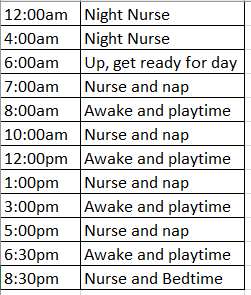Updated October, 2021
You’ve made it through the first six weeks of your little one’s life. Everyone says the hardest part of a new baby is those first six weeks, so things must be looking up now, right? Except to go with mainstream U.S. culture, it’s also likely that you will be returning to work soon (if you haven’t already) and the support that you were receiving (if any) is starting to drop off. So what sort of sleep expectations can you realistically expect in these next few weeks?
What to Expect
Your child is starting to learn the rhythm of night and day! This is the biggest step for your child to start sleeping through the night. Expecting your child to sleep through the night from birth to 6 weeks is unrealistic. These next few months your child will start learning that night is night and day is day, which means they will start to sleep for slightly longer periods at night.
As for naps, expect them to still sleep through most of the day. They will take between three and five naps, each ranging anywhere from a 30 minute nap to a 2 hour nap. They should be able to stay awake about an hour or two between naps.
Night time sleep plus naps totaled, your kiddo should be sleeping close to 15-17 hours every day. Getting enough sleep will help your little one be happy, alert, and attentive during their waking hours.
Sleep Training as Defined by Me
Now I personally use the term ‘Sleep Training’ to describe working with your child in any form to help them learn healthy sleep hygiene. Ultimately, this will look like them sleeping through the night without problem. To be very clear, Sleep Training, as defined by me, is NOT the cry it out method.
Sleep training is about balancing appropriate developmental expectations with the needs of your child. It is about being responsive and supportive. Most of all, it is about helping you move towards a sleep routine that makes sense for you and your family.

6 Week to 3 Month Sleep Practices
Starting around week 6, you can really start working towards a healthy sleep routine, both for your baby and yourself. The biggest change, determining night from day, is going to make a huge difference. I know it won’t feel like much, but the shorter interruptions at night are going to help you feel more rested.
Keep Nights Sacred
Think of night as your sacred sleep time. Yes, you are still going to need to wake up for feedings and diaper changes, but keep it dark, quiet, and pretty uninteresting. The goal is to meet the needs of your child and then send them back to sleep. Try not to engage them too much, even to sing them back to sleep.
Get Into a Routine
Literally every blog from me about sleep will have something about routine in it. This is because routine is what is going to help your child learn when to sleep and when to be up and party. I personally always liked to nurse to sleep as well, so we would wake, play for awhile, change diaper, and nurse. This consistent routine helps prompt your child towards sleep.
Protect the Nap
Nap time is incredibly important. Your tiny human needs a lot of sleep. As tempting as it might feel to use sleeping as an opportunity to be on the go, I highly encourage you to protect the nap. As your child gets older, I think you can adjust this a bit, but at this early age, make sure they have time to sleep, ideally in their nap location, with minimal adjustments.
Drowsy but Awake
If so inclined, you can start to put your child down when they are tired but still awake. It may feel a little early for this (6 weeks will be harder than 3 months), so you have to adjust based on your needs. What you are doing is helping your child learn how to put themselves to sleep on their own. If you always nurse to sleep, they will be reliant on either nursing or a pacifier in order to fall asleep. This means in the middle of the night, they will need one of those to help them sooth. Now to be clear, at this age you are likely still waking up with them in the middle of the night. This is more to practice for the future.
Habits to Avoid
Bad habits are much easier to form than they are to break. These are few simple habits to avoid creating in the first place.
Pushing Co-Sleeping
I wanted to co-sleep with my whole heart. I was convinced it was the best way to sleep with my child and I really wanted to. Around 2-3 months though, it suddenly became clear to me that co-sleeping was not working. My presence was causing my little one to wake up more frequently than if they were sleeping alone. So much to my disappointment, we moved Monster out of bed. The same thing happened with Rainbow Sprinkle.
Now I still love the idea of co-sleeping, but pay attention to yourself and your child. There may come a time when the best sleeping arrangement for your child will shift. When that happens, you have to be willing to let go of what you wanted and do what is best for your small human.
Overtired Schedules
Watch out for those over-tired cues that I mentioned in the first sleep blog (link to sleep blog coming Winter, 2021). Avoid a schedule that prevents your baby from getting adequate naps. Sleep begets sleep, so make sure they are well rested and don’t stretch their waking hours too long.
Sleep Schedule
At a 6 weeks to 3 month schedule, your schedule is still going to be pretty open ended. Aim for 3-4 hour stretches of sleep at night, with calm and quiet feedings from 9pm-6am or so. During the day, continue to follow your routine, making sure they get adequate sleep. Again, aim for 1-2 hours of wake time between naps. I like to try to stretch the longer wake times around when I would normally have free time. The image to the right is a very rough schedule for this age.

Sleep Help!
Need support with getting your child on the right track for sleep? View my Postpartum Doula page where I can offer sleep training for you and your family, including a night’s reprieve if you just need some time to catch up.


















Pingback: 5 Promises to my Future Child - Freedom Inside the Box
Pingback: Top 5 Books to Read When Pregnant - Freedom Inside the Box